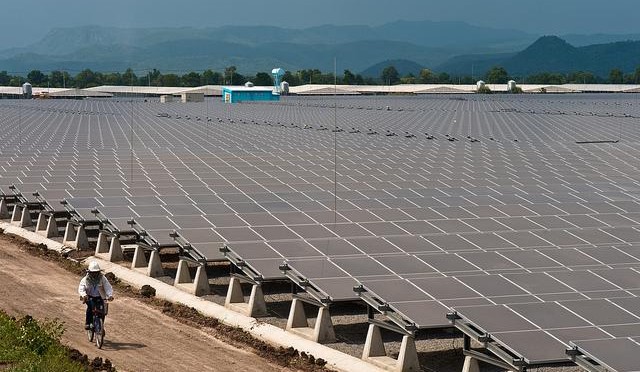Thailand, known for its plentiful sunshine, has spent years developing its solar energy industry.
Aside from the obvious environmental benefits, the motivation for using solar energy helps preserve the nation’s economy and reducing energy imports from its South East Asia neighbours.
The sector has become so successful that countries across Asia are now looking to replicate it.
Electricity Governance Initiative’s (EGI) 10 Questions to Ask about Scaling On-Grid Renewable Energy is a framework designed to facilitate multi-stakeholder engagement for improving renewable energy policy. The framework will be officially launched at WRI’s Washington, D.C. office on January 23rd, 2014.
Learn more or sign up to attend the event here.
Thailand is expected to become one of the leading solar PV markets in Southeast Asia. It was one of the first Asian countries to pursue renewable energy development, putting in place policy incentives back in 2006. This past summer, the country announced one of the more ambitious regional solar PV targets, seeking to develop 3,000 megawatts (MW) by 2021.
Yet despite its ambitions, solar PV development has been a challenge in the country. Thailand’s generous Feed-in Tariff (FIT ) program, a policy designed to stimulate investment in renewable power through additional payments to renewable energy generators, resulted in a “solar gold rush” in 2008, leading to a number of speculative rather than realizable projects in the pipeline. Ultimately, the government shut the door to new solar projects in 2010. Experts criticize the country’s FIT program and the government’s weak regulatory framework for being inadequate at responding to changing market conditions, such as declining prices of solar PV modules. Others criticize the program for failing to consider potential impacts on consumers by expecting them to cover the additional payments.
But there are signs of hope that Thailand’s solar power development is poised for a turnaround. The National Energy Policy Commission approved new solar policy plans this past year, including updated FIT rates that encourage local production by reserving 800MW for community-owned projects. And thanks in part to a new WRI tool, a multi-stakeholder group has emerged to ensure that Thailand’s solar power development proceeds in a way that is both inclusive and effective.
Using WRI’s New 10 Questions to Ask Framework
The Electricity Governance Initiative’s (EGI) new tool, the 10 Questions to Ask About Scaling On-Grid Renewable Energy (10Qs about Scaling RE), is a framework that can be used to promote multi-stakeholder engagement to improve renewable energy policies and plans. Through an easy-to-follow, question-based guide, it aims to empower electricity sector stakeholders to have a voice in energy policy-making and implementation processes. It seeks to promote “good” electricity policies—those designed to ensure effectiveness of public expenditures, reduce unnecessary costs, raise the quality of electricity services, and minimize social and environmental impacts while seeking to reach specific policy objectives. It posits that “good” policies are rooted in good governance, and the framework integrates the governance principles of transparency, accountability, and participation in its design.
The Chulalongkorn University’s Energy Research Institute, an EGI partner, tested the value of the 10Qs framework over the past year. Their experience illustrates how the framework can be used to ensure that renewable power development policy processes are robust and benefit all energy stakeholders.
The Thai Solar PV Roadmap Initiative
In 2012, experts from Chulalongkorn University’s Energy Research Institute convened stakeholders including Thai academics, civil society organizations, private sector representatives, and civil servants from institutions like the Ministry of Energy, Office of Regulatory Commission, and Electricity Generating Authority of Thailand. The meeting explored the potential of using the 10Qs about Scaling RE Framework to design a policy deliberation process for Thailand’s solar power development. Together, these stakeholders agreed to form the Thai Solar PV Roadmap Initiative (TSRI), an initiative that aims to provide the Thai government with recommendations on how to both effectively and inclusively pursue greater solar power development.
The TSRI is now evaluating the policy landscape and undertaking focused research activities to better understand issues related to grid connection of distributed electric generation, solar PV business models, and permitting processes. Issues raised in the 10 Questions framework catalyzed this research agenda.
Influential Thai NGOs, such as the Healthy Public Policy Foundation (HPPF), are also becoming involved in the Solar PV Roadmap project, convening civil society, community leaders, local governments, and media to discuss key issues that should be considered in the Roadmap. HPPF has been working with these stakeholders to conduct research on the development and use of solar energy at the local level, as well as to understand the costs and benefits associated with this type of generation. Pulling from these types of inputs and research, TSRI hopes to release a draft Solar PV Roadmap by March of 2014, which will provide a long-term strategy for solar energy development in Thailand.
A Tool for Creating a Shared Vision for Energy Development
Energy stakeholders from utilities to government officials to consumers can learn from TSRI’s experience. The 10Qs serve as a critical tool for both engaging a variety of stakeholders and for examining how renewable energy policies impact all parties—particularly as the industry scales up. In that sense, it can serve as a planning framework that is both forward-looking and inclusive.
http://santamarta-florez.blogspot.com.es/2014/04/thailand-pursues-solar-energy.html

